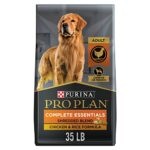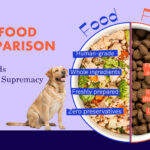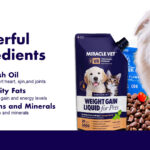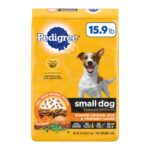The best dog food for allergies usually features limited ingredients and hypoallergenic formulas. It’s essential to choose a brand that avoids common allergens like beef, dairy, wheat, and chicken.
Owners of allergic dogs know the struggle of finding the right dog food. Allergies in dogs can cause discomfort and symptoms like itching, digestive issues, or skin problems. Selecting dog food that caters to these sensitivities not only alleviates these symptoms but also contributes to your pet’s overall health and well-being.
For an effective diet change, quality dog food brands offer solutions with novel proteins like venison or duck and easily digestible carbohydrates such as sweet potatoes or peas. This kind of specialized dog food is designed to minimize the risk of allergic reactions while ensuring your furry friend gets the necessary nutrients. Always consult your veterinarian before changing your dog’s diet to ensure you’re meeting your pet’s specific health requirements.
Understanding Canine Allergies
Selecting the best dog food for dogs with allergies can be pivotal to managing your pet’s health. Tailored diets with hypoallergenic ingredients support your dog’s well-being, offering relief from itchy skin and digestive discomfort. Explore specialized formulas to provide your furry friend with a wholesome, allergen-free feast.
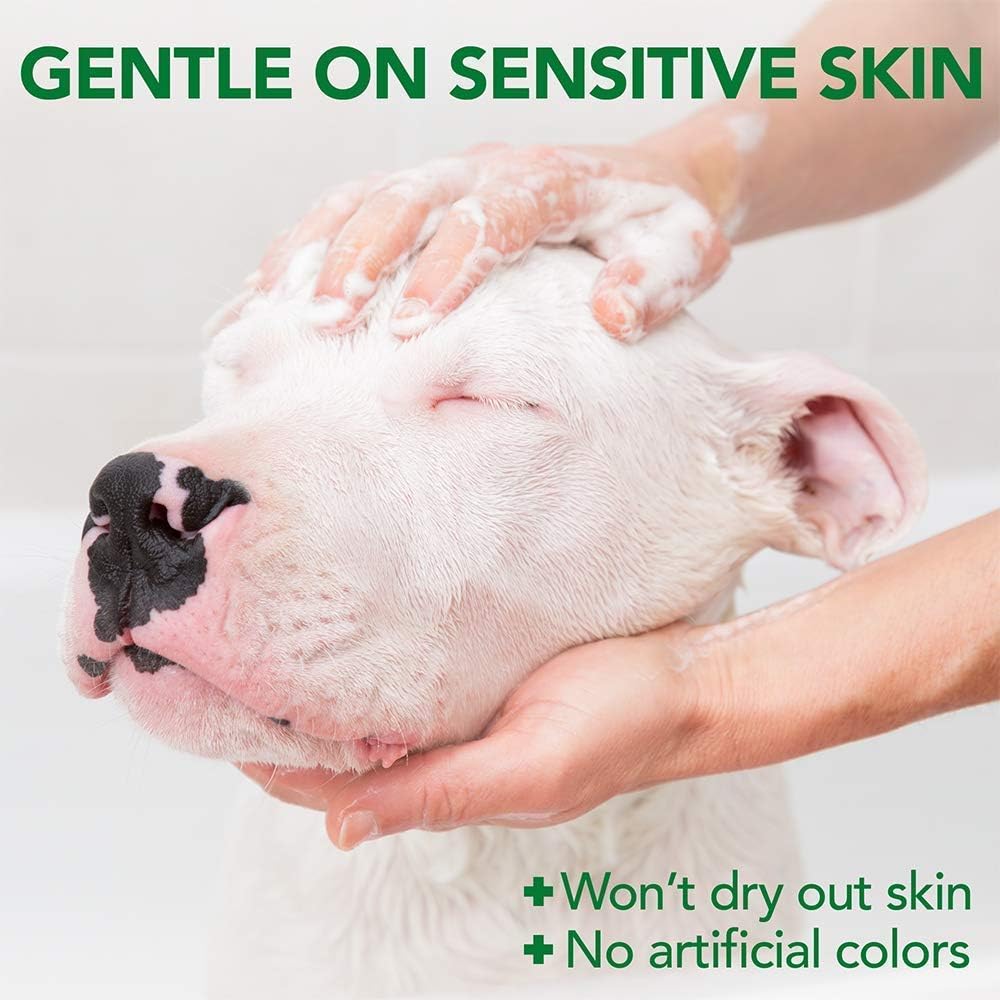
Identifying Allergens In Dog Food
For loving pet owners, a dog’s comfort and well-being are top priority. When it comes to feeding our furry companions, what they eat is crucial, especially for those with sensitive stomachs or allergy-prone systems. Identifying allergens is the first step towards providing a safe, itch-free diet for your pooch. Let’s dive into the world of dog food allergens, learn how to spot them, and make informed choices.
Common Allergens Found In Dog Food
- Proteins: Beef, chicken, dairy, and egg are top allergens.
- Grains: Wheat, corn, and soy can trigger reactions in some dogs.
- Gluten: A protein composite found in certain grains like wheat, barley, and rye.
- Additives: Artificial colors, flavors, and preservatives may also be problematic.
These ingredients can lead to symptoms ranging from itchy skin to digestive distress. It’s critical to identify which ingredient(s) your dog reacts to.
Reading Dog Food Labels For Allergens
- Start with the Ingredients List: Ingredients are listed by weight. Pay attention to the first five ingredients as they constitute the majority of the diet.
- Look for Specific Protein Sources: Single-source proteins are ideal for identifying allergies. Multiple protein sources can complicate the detection process.
- Identify Grains and Fillers: These are often included in dog food and could be allergenic. Grain-free options might be a better choice for some pets.
- Check for Additives: Keep an eye out for artificial flavors, colors, and preservatives.
- Seek Out Allergen Statements: Some products include a statement regarding potential allergens, usually near the nutritional adequacy statement or feeding guidelines.
It’s important to consult with a veterinarian, who may recommend a special diet or an elimination trial to pinpoint the exact allergen affecting your dog.
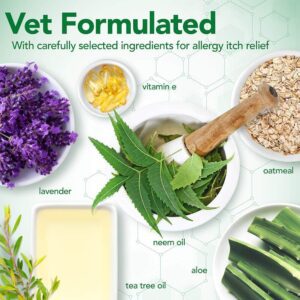
Choosing The Right Hypoallergenic Dog Food
Selecting premium hypoallergenic dog food is crucial for canines with sensitivities. Discover top-tier options designed to ease your furry friend’s allergy symptoms and promote overall health.
Factors To Consider When Selecting Hypoallergenic Dog Food
Every dog is unique, and so are their dietary needs, especially when dealing with allergies. Consider these critical elements:
- Identify the Allergens: Understanding what triggers your dog’s allergies is paramount. Common culprits include beef, dairy, wheat, egg, chicken, lamb, soy, pork, rabbit, and fish.
- Veterinarian Consultation: Always seek advice from a professional. A vet can provide insights into your dog’s specific condition and recommend a suitable diet plan.
- Quality of Ingredients: Opt for foods with high-quality, wholesome ingredients. Avoid artificial additives that can exacerbate allergies.
- Single Protein Sources: Foods with a single protein source can help isolate and eliminate the allergen.
- Specialized Formulations: Some dogs might need a grain-free, gluten-free, or novel protein diet that introduces them to a protein they’ve never had before.
Reviewing The Top Hypoallergenic Dog Food Brands
As the market overflows with options, here’s a focused look at the leading brands that cater to allergy-prone canines:
| Brand | Key Benefits | Protein Source |
|---|---|---|
| P.S. For Dogs 100% Hypoallergenic Dog Food | Limited ingredient diet, free from common allergens | Lamb |
| Hill’s Science Diet Sensitive Stomach & Skin | Promotes digestive health, vitamin E & Omega-6 for skin nourishment | Chicken |
| Canidae PURE Limited Ingredient | Grain-free, eight key ingredients for sensitive dogs | Various options (Salmon, Duck, Lamb, etc.) |
| Blue Buffalo Basics Limited Ingredient Diet | No corn, wheat, soy, dairy, or eggs, including LifeSource Bits | Various options (Turkey, Salmon, Lamb, etc.) |
| Natural Balance L.I.D. Limited Ingredient Diets | Minimal ingredients for optimal digestion | Various options (Bison, Duck, Venison, etc.) |
Remember, the best hypoallergenic dog food might not be the same for every dog. Trial and observation, in combination with professional guidance, are your best tools for finding the food that allows your canine companion to thrive.
Nutritional Requirements For Allergic Dogs
Selecting the best dog food for dogs with allergies requires an understanding of their unique nutritional needs. Tailored diets avoid common allergens, promoting a healthy immune response in sensitive canines.
Essential Nutrients For Dogs With Allergies
Just like any other dog, those with allergies require a diet that is rich in essential nutrients. The key difference is ensuring these nutrients come from sources that don’t provoke an allergic response. The following nutrients are crucial:
- Protein: High-quality proteins like hydrolyzed protein or novel protein sources that the dog has not been exposed to previously are excellent options.
- Fats: Balanced omega-3 and omega-6 fatty acids help maintain skin health, reducing allergy symptoms.
- Carbohydrates: Easily digestible carbs with minimal allergenic potential, such as rice or potatoes, may reduce allergic reactions.
- Vitamins and Minerals: A solid vitamin profile is essential, but some dogs can be allergic to certain types, so they may need to be carefully selected.
- Fiber: Fiber helps with digestive health, which can be beneficial for dogs with allergies.
Balancing A Hypoallergenic Diet
- Consult with a veterinarian to identify safe protein sources and other ingredients.
- Introducing a limited-ingredient diet to eliminate potential allergens.
- Incorporating novel protein sources the dog has never eaten before.
- Using hydrolyzed proteins the protein molecules are broken down so that the immune system doesn’t recognize them as allergens.
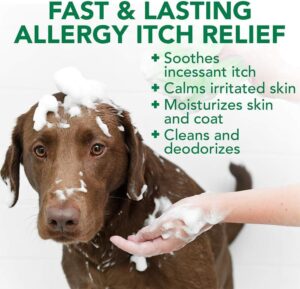
Transitioning To A Hypoallergenic Diet
Discover the top dog food choices for pets with allergies, tailored to alleviate symptoms and promote health. Transition smoothly to a hypoallergenic diet with options designed for canine well-being and allergy relief.
Steps For Transitioning Your Dog To A New Diet
Changing your dog’s diet requires careful planning to ensure it is both a successful and a gentle process. Follow these guidelines:
- Consult a veterinarian to confirm that the dietary change is suitable for your dog’s specific needs.
- Choose a high-quality hypoallergenic dog food that excludes common allergens such as beef, dairy, wheat, eggs, chicken, lamb, soy, pork, rabbit, and fish.
- Gradually introduce the new food over a 7-10 day period, starting with a mix of 75% old food and 25% new food, slowly increasing the proportion of new food each day.
- Monitor your dog closely for any signs of improvement or adverse reactions during this transition.
- Keep a consistent feeding schedule, which helps with digestion and the establishment of a routine.
Managing Potential Diet-related Allergies
Even with a hypoallergenic diet, some dogs may still experience allergic reactions. Here’s how to manage these potential concerns:
- Maintain a food diary: Record everything your dog eats along with any symptoms. This helps identify any specific food triggers.
- Introduce one ingredient at a time: This allows for easy identification of allergens if your dog has a reaction.
- Be aware of other sources of allergens: Treats, medications, and even flavored toys can contain ingredients that trigger allergies.
- Consider an elimination diet: If reactions persist, an elimination diet under veterinary supervision could pinpoint the cause.
Best Dog Food for Dogs With Allergies: Top Hypoallergenic Picks!
Discover top hypoallergenic dog food selections specifically tailored for canine companions suffering from allergies. These premium choices offer well-balanced nutrition while avoiding common irritants that trigger allergic reactions in sensitive pooches.
In-depth Review Of The Top 5 Hypoallergenic Dog Food Products
| Product | Key Ingredients | Protein Source | Free From |
|---|---|---|---|
| Brand A | Sweet Potato, Fish Meal | Salmon | Grain, Chicken |
| Brand B | Peas, Rabbit Meal | Rabbit | Beef, Grain |
| Brand C | Chickpeas, Venison | Venison | Corn, Wheat |
| Brand D | Quinoa, Duck Meal | Duck | Soy, Dairy |
| Brand E | Lentils, Kangaroo | Kangaroo | Chicken, Fish |
Customer Reviews And Feedback
- “Brand A has been a lifesaver for my allergic Labrador. No more itching and an improved coat!”
- Brand B resonates with owners seeking novel proteins like a rabbit, reporting better digestion and vitality.
- “My picky eater loves Brand C,” cites an owner who noticed higher energy levels with the venison formula.
- Enthusiasm about Brand D hinges on its digestive-friendly formula and relief from skin allergies.
- Last, Brand E receives praise for being an exotic alternative that curbed allergic reactions in many canines.
Homemade Hypoallergenic Dog Food
Crafting homemade hypoallergenic dog food ensures your sensitive pooch enjoys meals tailored to their dietary needs. Explore options brimming with nourishing ingredients that cater exclusively to canines grappling with allergies.
Benefits And Drawbacks Of Homemade Hypoallergenic Dog Food
- Controlled ingredients allow you to eliminate common allergens specific to your dog’s needs.
- You can ensure the freshness and quality of meals.
- Customizing nutrition to suit your dog’s unique health requirements is possible.
- Many dogs prefer the taste of home-cooked meals over processed foods.
- A poorly designed diet could lead to nutritional imbalances.
- It can be time-consuming to prepare meals consistently.
- Without careful planning, homemade diets can be more expensive in the long run.
Recipe Ideas For Homemade Hypoallergenic Dog Food
Here are some hypoallergenic recipe ideas that you can tailor to your dog’s specific dietary needs:
| Recipe Name | Key Ingredients | Preparation Steps |
|---|---|---|
| Salmon & Sweet Potato | Salmon, Sweet Potato, Zucchini, Olive Oil | Bake salmon, steamed sweet potato, and zucchini mix together with olive oil. |
| Turkey & Pea Stew | Ground Turkey, Peas, Carrots, Brown Rice | Cook turkey, add boiled peas and carrots; stir in cooked rice. |
| Lamb & Squash Dinner | Lamb, Butternut Squash, Spinach, Apple Cider Vinegar | Grill lamb, steam squash, sauté spinach; blend with a dash of apple cider vinegar. |
Frequently Asked Questions On Best Dog Food For Dogs With Allergies
What Type of Dog Food Is Best for Dogs With Allergies?
What Is the Best Food to Feed a Dog With Itchy Skin?
What Are the Worst Food Allergies for Dogs?
What dog treats are good for dogs with food allergies?
What causes allergies in dogs?
How Do You Identify Dog Food Allergies?
What Ingredients to Avoid for Allergic Dogs?
Conclusion
Navigating the journey of finding the right dog food for your allergy-prone pooch can be daunting. Yet, with the right knowledge and choices detailed in this post, relief is within reach. Remember, each dog is unique—consulting a vet is paramount for personalized advice. Armed with these insights, your furry friend will thank you for the improved health and happiness that come from a suitable, allergy-friendly diet.


